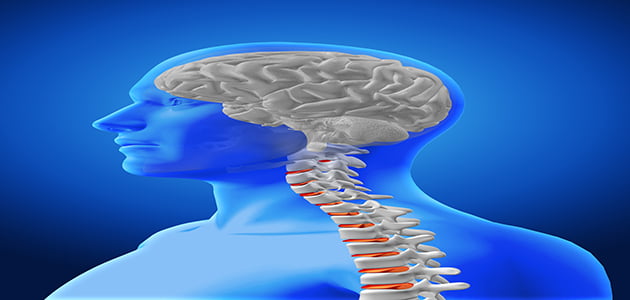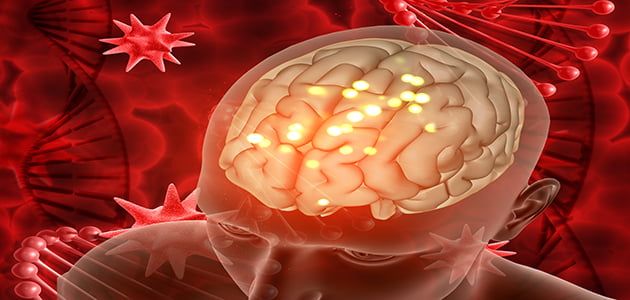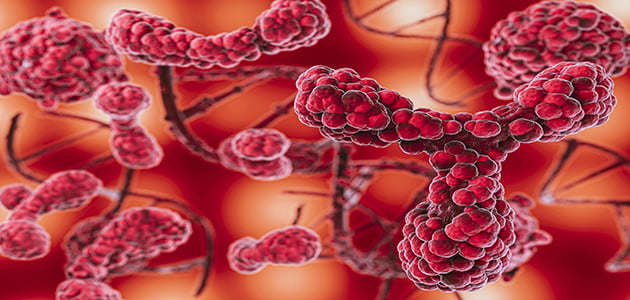Multiple sclerosis; MS disease symptoms, diagnosis and treatment
Multiple sclerosis is a chronic condition of the central nervous system, In the article, we will go over MS disease symptoms, diagnosis, treatment and other

Multiple sclerosis; occurs when your immune system destroys the coating that surrounds your nerve cells, known as myelin. Without this protective layer, your nerves become injured, resulting in communication problems between your brain and the rest of your body.
قائمة المحتويات
The earliest symptoms usually appear between the ages of 20 and 40. Most people with MS attack, often known as relapses, when their disease deteriorates substantially.
Many new medications have been discovered in recent years that can often help prevent relapses and decrease the disease’s symptoms.
What is ms diseases
Multiple sclerosis(MS) is a chronic condition that affects your spinal cord, brain, and optic nerves in your eyes. It can impair vision, balance, muscle control, and other essential bodily functions.
The signs and symptoms of the disease differ from person to person. Some persons just experience minor symptoms and might not require therapy. Others will have difficulty getting around and performing daily duties.
Multiple sclerosis symptoms
Because of the damage, your brain is unable to transmit impulses across your body correctly. Your nerves are also not working as well as they should to assist you in moving and feeling. As a result, you might have symptoms like: [efn_note]What Is Multiple Sclerosis?, webmd.com, 14 /8 /2023 .[/efn_note]
- Having difficulty walking.
- Feeling exhausted.
- Muscle spasms or weakness.
- Double vision or blurred vision.
- Tingling and numbness.
- Sexual issues.
- Weak bladder or bowel control.
- Depression as a result of pain.
- Problems concentrating or remembering.
“Read also: seasonal depression“
Multiple sclerosis causes

Multiple sclerosis; has not been recognized its cause. It is classified as an immunological-mediated disease since the immune system of the body attacks its own tissues. In the case of multiple sclerosis, the immune system dysfunction destroys the fatty material (myelin) that coats and protects nerve fibers in the brain and spinal cord.
Myelin is like the insulating layer on electrical cables. Messages may be slowed down or inhibited as they travel along a nerve fiber when the myelin covering it is damaged and exposed.
It is unknown why some people develop MS and others do not. It appears that a combination of hereditary and environmental variables are the cause.
Risk factors
The following variables can increase your chances of having multiple sclerosis:
- A family history: You are more likely to have MS if one of your parents or siblings has had the disease.
- Age: MS may happen at any age, however it commonly occurs between the ages of 20 and 40.
- Some infections: MS has been associated with a number of viruses, including Epstein-Barr, the virus that causes infectious mononucleosis.
- Race: White persons, especially those of Northern European heritage, are most likely to get MS. Asian, African, or Native American ancestry are least at expose. According to one recent study, the percentage of Black and Hispanic young individuals with multiple sclerosis may be higher than previously assumed.
- Sex: Women are more than two to three times more likely than men to develop relapsing-remitting MS.
- The vitamin D: insufficient vitamin D levels and insufficient exposure to sunlight are linked to an increased risk of MS.
- Some autoimmune disorders: If you have other autoimmune conditions such as thyroid disease, pernicious anemia, psoriasis, type 1 diabetes, or inflammatory bowel disease, you are at a slightly greater risk of getting MS.
- Climate: MS is significantly more common in temperate temperature countries such as Canada, the northern United States, New Zealand, southeastern Australia, and Europe. Your birth month may also influence your chances of having multiple sclerosis, as sun exposure during pregnancy appears to reduce the development of multiple sclerosis in these children.
- Your genes: A gene on chromosome 6p21 was discovered to be linked to multiple sclerosis.
- Smoking: Smokers are more likely than nonsmokers to develop a second event that confirms relapsing-remitting MS after experiencing a first symptom that may indicate MS.
- Obesity: Females have been discovered to have a link between obesity and multiple sclerosis.
“Read also: Headache“
Multiple sclerosis diagnosis

MS can be difficult to diagnose because its symptoms are similar to those of many other neurological illnesses. If your doctor suspects you have it, he or she will refer you to a neurologist, a specialist who treats the brain and nerve system.
They’ll ask you questions about your medical history and examine you for evidence of nerve damage in your brain, spinal cord, and optic nerves. [efn_note]Understanding Multiple Sclerosis (MS), healthline.com, 14 /8 /2023.[/efn_note]
MS cannot be diagnosed with a single test.Your doctor will use a variety of them to examine you.These could include:
- Blood tests are used to rule out diseases that cause symptoms similar to Lyme disease and HIV.
- Cerebrospinal fluid (CSF) analysis is the study of the liquid that cushions your brain and spinal cord. This will be accomplished via lumbar puncture or spinal tap. Specific proteins are commonly seen in the CSF of people with MS.
- Balance, coordination, vision, and other functions are tested to evaluate how well your nerves are operating.
- Evoked potential tests capture the electrical signals generated by your nervous system in response to external stimuli.
- An MRI is a test that produces detailed images of the structures in your body (specifically your brain or spinal cord).
- OCT (optical coherence tomography) is a technique for detecting abnormalities in the retina that may indicate brain atrophy.
“Read also: طرق تقوية المناعة“
Multiple sclerosis treatment

Although there is no known cure for MS, a number of therapies can make you feel better and maintain your body operating as it should.
Additionally, your doctor might suggest drugs to slow the disease’s course, stop or treat attacks, treat symptoms, minimize stress-related symptoms, or a combination of the above.
Among the medications that may slow your MS or help with nerve damage are:
- Dimethyl fumarate (Tecfidera).
- Diroximel fumarate (Vumerity).
- Fingolimod (Gilenya).
- Mitoxantrone (Novantrone).
- Monomethyl fumarate (Bafiertam).
- Natalizumab (Tysabri).
- Ocrelizumab (Ocrevus).
- Ofatumumab (Kesimpta).
- Ozanimod (Zeposia).
- Ponesimod (Ponvory).
- Siponimod (Mayzent).
- Teriflunomide (Aubagio).
- Ublituximab-xiiy (Briumvi).
- Alemtuzumab (Lemtrada).
- Glatiramer acetate (Copaxone, Glatopa).
- Monoclonal antibodies. Ofatumumab (Kesimpta, Arzerra).
- Beta interferon (Avonex, Betaseron, and Rebif).
- Cladribrine (Mavenclad).
- Dalfampridine (Ampyra).
“Read also: فوائد الرياضة للجسم“
Treatments for MS signs and symptoms
Other medications, such as muscle relaxants, tranquilizers, or botulinum toxin (Botox), can also be used to treat muscle spasms and some of the other symptoms.
A physical therapist can give you exercises to help you maintain your strength and balance while also managing fatigue and pain.
An occupational therapist can teach you new techniques to complete chores that will make it simpler for you to work and care for yourself. A cane, walker, or braces can help you walk more easily if you have difficulty getting around.
You can relieve your MS symptoms in addition to treatment. Get frequent exercise and avoid excessive heat to enhance your metabolism.
Treatments for MS attacks
- Corticosteroids, such as intravenous methylprednisolone and oral prednisone, are utilized for relieving nerve irritation. Side effects may include increased blood pressure, increased blood glucose levels, insomnia, mood swings and fluid retention.
- Plasma exchange (plasmapheresis) is a type of plasma exchange. Your blood cells are separated from the liquid portion of your blood (plasma). After that, the blood cells are combined with a protein solution (albumin) and returned to your body. If your symptoms are new, severe, and have not responded to steroids, plasma exchange may be performed.
Home remedies and way of life
To assist improve MS symptoms, consider the following:
- Exercise:Regular exercise can help improve your strength, muscular tone, balance, and coordination if you have mild to moderate MS. If you have a heat intolerance, swimming or other water workouts are good possibilities: Walking, stretching, low-impact aerobics, stationary bicycling, yoga, and tai chi are other types of mild to moderate exercise that are recommended for patients with MS.
- Consume a well-balanced diet: Experts propose a broad healthy diet because there is insufficient evidence to support any particular diet. Some evidence suggests that vitamin D may be beneficial to patients with MS.
- Calm down: Some persons with MS may experience worsening symptoms when their body temperature rises. Avoiding heat exposure and using cooling scarves or vests can be beneficial.
- Get enough rest:Examine your sleeping patterns to ensure you’re getting enough rest. You may need to be checked and maybe treated for sleep disorders such as obstructive sleep apnea to ensure you’re getting adequate sleep.
- Reduce stress: Stress might cause or increase your signs and symptoms. Yoga, tai chi, massage, meditation, or deep breathing exercises may be beneficial.
Multiple sclerosis has not been recognized its cause.It is classified as an immunological-mediated disease since the immune system of the body attacks its own tissues. In the case of multiple sclerosis, the immune system dysfunction destroys the fatty material (myelin) that coats and protects nerve fibers in the brain and spinal cord. Although there is no known cure for MS, a number of therapies can make you feel better and maintain your body operating as it should. Additionally, your doctor might suggest drugs to slow the disease's course, stop or treat attacks, treat symptoms, minimize stress-related symptoms, or a combination of the above.what are 4 sign for MS ?
What causes to get MS ?
Can MS be cure ?
Finally, the multiple sclerosis patient is able to adapt and coexist with life, but it is necessary to understand him and everyone around him about his health condition and to increase his awareness of how to avoid complications. His continuous follow-up with the doctor and his commitment to treatment will increase the improvement of his health condition.

التعليقات مغلقة.